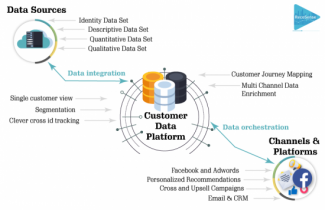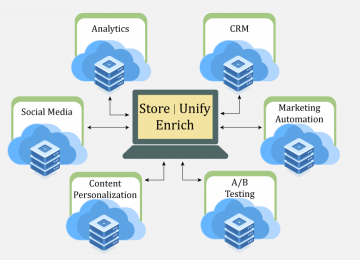Many large companies and new startups, in recent times, have been extensively using the Customer Data Platform (CDP) to meet their marketing requirements. Here is a brief overlook of what is the privilege enabled for marketers by using CDP for marketing automation? What are the takeaways for marketers from CDP? How it will be vital for intelligent data-driven marketing strategies?
Marketing is the tool that drives sales for a business. The more data you have about customers, products, and services, the better you can curate your offline or online ad campaigns to yield maximum positive results. Since technology has made its way into people’s lives all over the world, the digital marketing realm has seen unprecedented growth over the last few years.
Digital marketers have constantly been trying to come up with newer and more innovative digital marketing strategies. Although not all digital marketing professionals agree on the same set of rules and guidelines, most of them concur that this niche is highly data-driven.
What is a Customer Data Platform (CDP)?
Marketers and business analysts are constantly tasked with analyzing mountains of customer data to curate top-notch intelligent marketing strategies.
However, for a large company, the customer data can be overwhelmingly monumental. It is practically impossible to segment digital information of each customer data that the company has collected.
To solve this problem, innovations in software and technology gave birth to CDPs that can condense worlds of data into understandable and easily quantifiable infographics, among other things.
Let us dive into how CDP enables intelligent marketing automation by working in unison with a company’s business model to facilitate easier, faster, and more effective data-driven marketing strategies.
Marketing and CDP – How they go Hand-in-Hand
The customer data platform(CDP) deals with many aspects of data. It serves many aspects of business operation as seen by the picture below, this blog orchestrates how CDP will be vital in enabling an intelligent marketing automation process.

What Is the Importance of CDP in Marketing Automation?
The amount of data has become so extensive that it is not humanly possible to manually collect, organize, and interpret data for viable digital marketing plans.
Moreover, marketing automation requires a pre-defined data set that is finite and aggregated by the marketer to carry out repetitive functions like social media posting and mass email campaigns. But with the data available in the present day, it is not possible for a person to manually catalog it.

Such a setback makes the overall business vulnerable to competition since it hinders the process of planning and strategizing marketing tactics. At the end of the day, if not for CDP, most of your customer data would have been evinced useless and non-actionable.
A Customer Data Platform (CDP) helps you condense any amount of information into a human-readable format. The software does this by creating customer databases that provide structure to data in real-time.
By analyzing customer profiles, digital marketing strategists are conveniently exempt from the nerve-racking process of collecting and organizing terabytes of data.
With the help of CDPs, marketers, and analysts are now able to focus on the most important aspect, i.e., planning and formulating intelligent data-driven marketing campaigns.
How is CDP Transforming Modern-day Marketing for Good?
While many tools are oriented towards improving customer satisfaction, like Customer Relationship Management (CRM) platforms, they are not particularly useful when it comes to marketing. On the other hand, traditional marketing automation tools are focused only on giving visibility to your product, and that depends on how well you can collect and segregate your data manually.
A Customer Data Platform (CDP) bridges the gap between customer satisfaction and data acquisition. By collecting personally identifiable information (PII) and first-party data, you can gain the best insight into just the data that maximizes customer satisfaction.
This marketing tool has been a blessing in disguise for digital marketers worldwide because they do not have to brainstorm the customer’s likes or dislikes by looking at the data presented to them. The data now talks to them, metaphorically.
With CDPs, digital marketers are empowered with the best in class data-driven marketing methodologies. So now, there is no more hard work: rather, it is all about smart work. From email marketing to Google Adwords, CDP has got you covered.
What Kind of Customer Data is Typically Used?
A CDP helps companies to be as customer-centric as possible. Here are four types of customer data that a CDP typically emphasizes.
1. Identity Data Set
This data set includes all the parameters of an individual that differentiates them from the masses. Some of them are:
- Name
- Location
- Age
- Gender
- Phone number
- Email address
- Job
2. Descriptive Data Set
A descriptive data set gives you background and secondary information about your customer like:
- Designation
- Marital status
- Number of children
- Sexual orientation
- Number of vehicles
- Types of vehicles
- Hobbies
3. Quantitative Data Set
Quantitative data sets take into account all the behavioral information of the customer that can be quantified and calculated. Below are some examples:
- Time of purchase
- Amount of purchase
- Frequency of purchase
- Number of email opening
- Number of clicks
- Communication frequency
- Engagement frequency
4. Qualitative Data Set
Qualitative data sets are those information variables that are not quantifiable but can be analyzed to figure out if they are in line with the company’s motives, values, and philosophies. Some examples of this are:
- How the customers arrived at a destination?
- What they think about the platform or the company?
- What they think about the product?
- What they think about the service?
- What their favorite color, food, etc. is
Key Takeaways for Marketer by Using a Customer Data Platform(CDP)
On the one hand, it simplifies the complex and time-consuming processes such as manual data management, verification, deduplication, etc. Overall of this nullifies human errors and empowers data-driven intelligent marketing automation.
It lever
ages vital inputs for marketers to optimize customer data-driven digital marketing strategy.
Following are some examples of CDP applications for Digital marketers:
1. Facebook & Google Ads
Linking CDP to ad platforms such as Facebook and Google can result in efficiency in marketing by targeting the right audience with the right message.
2. E-mail & CRM
CDP enables you to analyze the customer behavior & gives you better inputs on engagement metrics and a clearcut 360-degree view of customers with which you can identify risk customers and reach them with purchase incentives.
3. Personalized content recommendation
CDP enables clever in video suggestions, and personalized content recommendation which can empower customer engagement and customer retention ultimately quantifying the revenue especially for digital publishers.
4. Dynamic offer engine
Ai powered personalized offer engine can enable smart product recommendations especially in e-commerce stores which empowers user experience by providing personal merchandising, cross-sell & upsell recommendation engine & personalized retargeting.
What Are the Advantages of CDPs?
Here are some advantages of CDPs because of which companies are leaving behind the traditional systems.
1. It Is Omnichannel
Traditional systems offer a multi-channel spectrum where you can target customers on various platforms through different campaigns, but all of these campaigns are mutually exclusive.
An omnichannel system, like that offered by a reputed CDP, bridges the gap between different platforms and customers, thus maximizing your return on investment (ROI).
2. Pulling in data from multiple sources
Marketing automation tools can save marketers a lot of time. But, ultimately, they depend on a finite data set that has to be manually provided by the marketer after collecting from various sources. This, of course, is not viable when you have a large number of sources.
Customer Data Platforms help the user by automatically acquiring data from all possible channels onto one platform and truncating them.
Get CDPs for Better Marketing
The days of traditional and conventional marketing strategies are fading away. Transitioning from the old system to incorporate a customer data platform for omnichannel data-driven marketing will be a game-changer for your business.
If you’re looking for an intelligent and adaptable way to organize your database, check out RecoSense’s omnichannel CDP by clicking here.
The days of smart marketing are here!

One Comment
Role of AI in Recovery of Digital Shopping Cart Abandonment | RecoSense
[…] retargeting is another powerful tool for better digital shopping cart recovery. Retargeting advertising relies on cookies that help eCommerce merchants to keep track of the pages visited by the user and […]